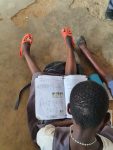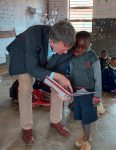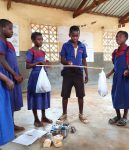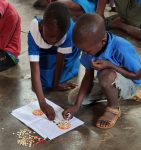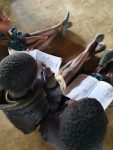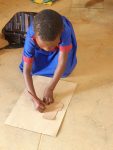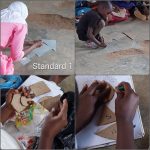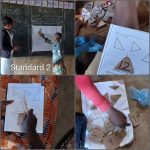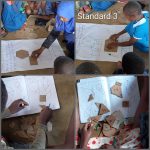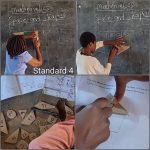Your cart is empty
- Home
- News
- Brombacher
- Brombacher & Associates’ role in the National Numeracy Programme (Malawi)
Brombacher & Associates’ role in the National Numeracy Programme (Malawi)
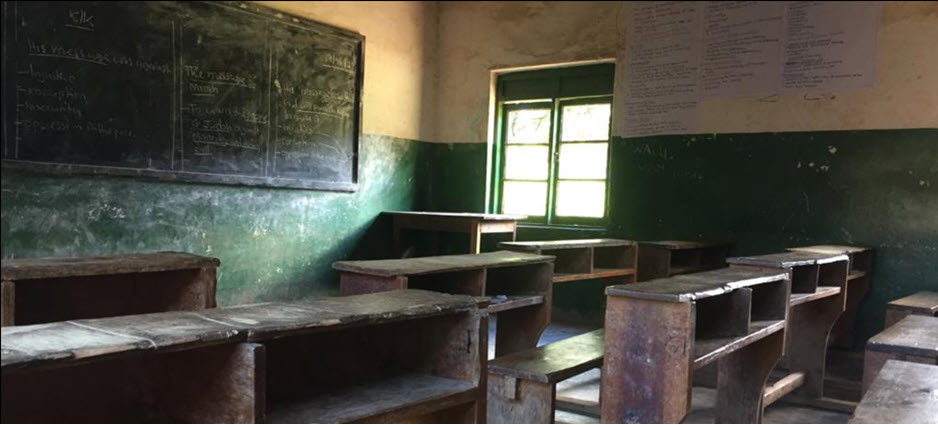
- Brombacher & Associates’ role in the National Numeracy Programme (Malawi)
The National Numeracy Programme is a Government of Malawi programme led by the Ministry of Education. The programme aims to improve learning outcomes in mathematics by strengthening foundational skills.
The National Numeracy Programme (NNP) is a Government of Malawi programme, led by the Ministry of Education and funded by UK aid from the UK government. Mott Macdonald/Cambridge Education has been appointed to manage the programme. The NNP aims to improve learning outcomes in mathematics by strengthening foundational skills in mathematics and will be rolled out over the next three years (see Figure 1).
Figure 1: NNP timeline
 Image source: NNP website
Image source: NNP websiteThe programme is a response to a scoping study led by Aarnout Brombacher in 2018. The scoping study found that the Malawian mathematics environment is characterised by limited and limiting expectations of learners and that the focus of teaching is on form (rote procedures and knowing) over substance (knowing with understanding, application and reasoning). The full scoping study can be downloaded here: Scoping Study.
Against the background of the findings of the scoping study, the focus of the NNP is on developing a vision for what it means to teach and learn mathematics in Malawi and to develop teaching and learning materials as well as a teacher training programme. The materials and training approach are being piloted in 200 schools during the 2022 school year and will be refined based on the learnings from the pilot activity before the programme is scaled to all 5 700 primary schools in Malawi.
Aarnout Brombacher is the Technical Principal of the NNP and is responsible for leading the visioning, materials development and teacher training programme development as well as overseeing the pilot and scale-up activities.
The materials development activity began with a visioning activity in February 2022. A team of fifty teachers and teacher training college lecturers, selected by the Malawi Ministry of Education (MoE), as well as representatives from various ministry departments participated. The purpose of the envisioning workshop was to develop a common understanding of what it means to do, and be successful in mathematics. The outcome was a consensus that for children to be successful in mathematics, they need to know with understanding, be able to apply what they know in unfamiliar situations and explain and justify what they are doing (reasoning).
After the visioning activity the team of writers, with technical assistance provided by Brombacher and Associates (B&A), first set about revising the mathematics curriculum for lower primary (Standards 1-4). Next the team set about developing learner materials aligned with the vision and curriculum already developed. A total of seven monthly, week-long writing workshops took place between March of 2021 and April 2022. The workshops began with the writing team developing a common understanding of the importance, role and approach to teaching for each of the core elements of the curriculum. This understanding was informed by a review of the literature on how children learn each topic and the implications that this has for teaching. The outcome of the writing activity is a workbook series for Standards 1 to 4 that assumes that each child has their own workbook for each term of the school year and that they work through the workbooks at a rate of one page per school day. In addition to the learner workbooks, a Teacher Guide and teacher training videos were also developed.
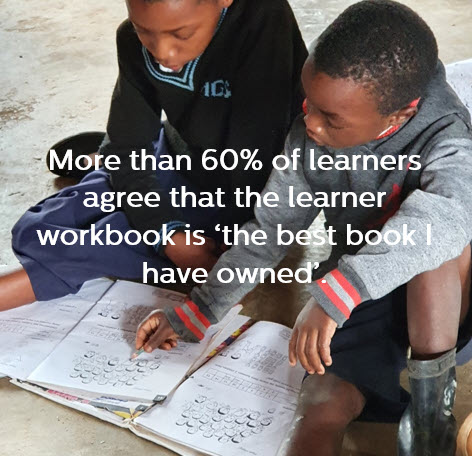
Starting in September 2021, all the teachers and learners in the 24 primary schools represented by the writers on the writing team pre-piloted (trialed) the materials for the third term of the 2021 school year. Valuable lessons were learnt about the implementation of the teaching and learning materials as well as the approach to the training of teachers. These lessons were incorporated in the materials and the training approach before the start of teacher training for the pilot phase conducted during the 2022 school year.
Following on the development, pre-piloting and revision of the materials, the writing team joined the team of Master Trainers and Trainers responsible for training teachers from the 200 schools participating in the 2022 school year pilot activity. Teacher training was conducted through a three-layer cascade model. Aarnout and the B&A team trained the Master Trainers. The Master Trainers with support from the B&A team, in turn, trained Trainers who were responsible for training the teachers from the pilot schools distributed across 19 zones nationally.
Aarnout’s leadership and passion for the improvement of learning opportunities and outcomes at classroom level, as well as the engagement and commitment of the writing team and teaching community are paving the way for materials, and teaching and learning approaches that promote a culture of mathematics that focuses on developing mathematics knowledge with understanding that can be applied in unfamiliar situations with reasoning.
While the findings of the rigorous independent evaluation of the pilot phase are eagerly awaited, early indications are that teachers are enthusiastically embracing the methodologies and implementing these in their classrooms and that children are engaging with interest and increasing confidence. Figure 2 summarises a few of the preliminary findings of the independent evaluation of the pilot phase after just a few weeks.
Figure 2: Preliminary findings of the independent evaluation of the pilot phase after just a few weeks of implementation
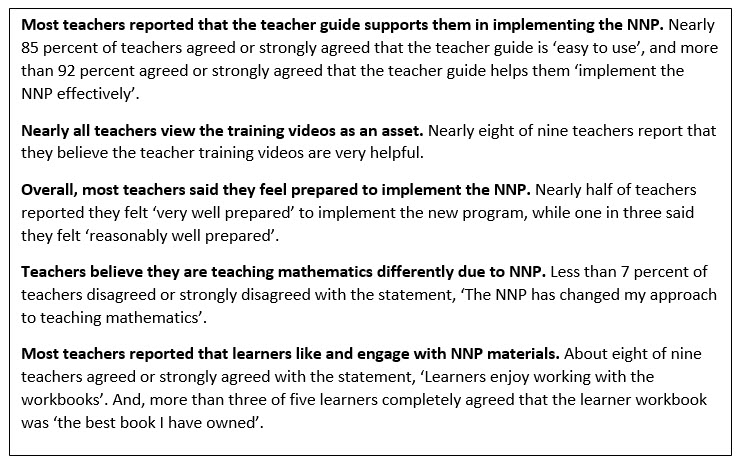
Aarnout and the B&A Team feel both privileged and humbled by the opportunity to make a small contribution to the transformation of mathematics teaching and learning in the early grades of Malawian schools.
Watch the NNP video journey here: NNP video
June 2022
